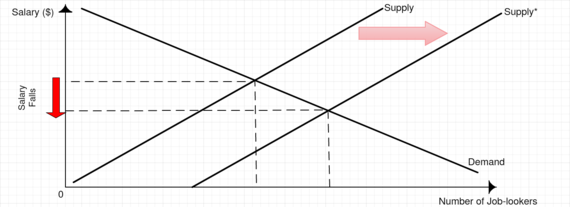Ask anybody looking for a job in impact investing, corporate responsibility, or social enterprise and you'll hear the same thing over and over again: There aren't enough impact jobs that provide a decent salary.
I'm writing this post from the 2015 Net Impact conference - an inspiring convening of over 2,500 young professionals looking for impact careers. Sadly, most of them won't get the job they've been dreaming of - unless they take matter into their own hands.
The real reason there aren't as many impact jobs is because companies cannot make payroll if it only has employees focused on corporate social responsibility.
This issue is exacerbated by basic economics: high demand and low supply means that organizations are able to offer lower salary and still have a huge candidate pool.
At the same time, there aren't enough jobs in foundations, impact investors, or nonprofits. This is especially true in the field of global development as most organizations are hiring in the actual countries of operation where there are lower salaries and a better understanding of cultural differences.
The Evolution of Impact Jobs
Once upon a time, the only impact jobs were in nonprofits or the government. However, in the 1960's, companies started to create "corporate responsibility" initiatives to offset some of the damage they were causing. These positions were primarily focused on improving the image of companies by giving money, but it's debatable how much impact these positions actually created. As a result, this approach has started to evolve.
Leading thinkers on the role of the "corporate social responsibility" position now argue that the role of this position is to help their businesses do less harm. In other words, the role CSR professionals is to help their business do good as part of its day-to-day operations.
Herein lies the hope for anybody that wants an impact career: In the future, there won't be such a thing as CSR. It'll be integrated into every single position within every company.
Everyone Can Create Their Own Meaningful and Impactful Career
In a panel at #NI15 called Making Social Impact the New Professional Norm, Aaron Hurst, founder of Taproot Foundation and Imperative, shared that the most important factor in career satisfaction is not the impact you make, but the purpose you find it.
In other words, people will find satisfaction and perform at their highest if they find meaning in their work, not necessarily that it is meaningful to start with.
There are two forces at work here that job searchers need to know:
- CSR is evolving into a required part of every position at every company
- Your own sense of purpose, not the impact of your work, is what will keep you engaged and happy (research proves it)
In the opening keynote at Net Impact, Stephen Ritz of Green Bronx Machine shared that anyone, at any position, can create sweeping change. He shared his story that, as a teacher, he has helped transform parts of the Bronx by planting seeds, rapidly improved graduation rates, and even creating jobs in the process.
The same lesson applies to you. Job positions don't make a positive social and environmental impact, people do.
- People working in sales and marketing can use cause-based campaigns and only work with partners that focus on sustainability
- People working in sourcing and supply chain can work with ethical and sustainable suppliers, and put pressure on more suppliers to adopt sustainable practices
- People in HR can create leadership development programs that are built on service and screen for purpose during hiring
- Managers and leaders can add ethical sourcing and environmental impact goals to their own teams
- People in product design and development can create more efficient and green products and applications
5 Tips to Make Your Job an Impact Job
If you want an impact job, you have to create it.
What if you could convince your manager to let your job be measured on creating a positive net impact, at least part of it, regardless of where you work in a company?
As Aaron Hurst shared at the Net Impact conference, "If you want people that are good for the bottom-line, you want people that are purpose oriented". In fact, there are many great research-backed reasons business should become more sustainable.
- Pick jobs that can be flexible, at least in terms of how performance is measured.
- Analyze your goals, your manager's goals, and your business's goals, and look for ways that sustainability and equality initiatives can make a positive impact towards those business goals
- Develop a proposal to add impact initiatives to your personal goals and commitments that are in-line with the company's strategy
- Measure the social, environmental, and business impact of your work, and share it with all stakeholders
- Use the impact you create to forge new partnerships with other business units, and help them integrate impact initiatives
This new idea of an impact career might not be as attractive as the corporate responsibility positions of today, but they will be more impactful. These changes to ordinary jobs might be challenging to make, but they are what will actually create sustainable change. There might not be a clear roadmap to evolve your position into an impact position, but forging a trail will enable others to follow. And if we can get more people to integrate positive impact into their positions, than we can actually course-correct our economic system so that it can actually make the world a better place.
As Seth GoldmAn, TeaEO of Honest Tea shared, "If we don't change the direction of where we're going, we'll end up where we're headed." And the first step to doing just that is making sure your job creates a positive net impact, no matter where you work.

